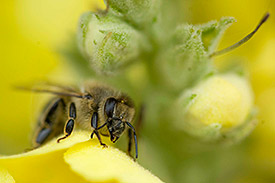Press release by ALTER-Net, Europe’s Ecosystem Research Network, 19 May 2015
Nature provides solutions to Europe’s woes?
Nature-Based Solutions to societal challenges have come to the forefront all over the world, and interest in such solutions is large in EU due to the potential economic, labor, social and environmental benefits. These solutions are being developed, e. g. to promote health and well-being, and to revitalize cities. ALTER-Net, Europe’s Ecosystem Research Network, organizes an international conference on May 19th to 20th in Ghent, Belgium, focusing on the potential of Nature-Based Solutions to Societal Challenges in urbanized regions. ALTER-Net does this in cooperation with the European Commission, under the auspices of the Latvian Presidency of the Council of the European Union.

Pollination is just one example for Nature-Based Solutions (NBS) but a very impressive one. The worldwide economic value of the pollination service provided by insect pollinators, bees mainly, was estimated some years ago €153 billion per annum for the main crops that feed the world. This figure amounted to 9.5% of the total value of the world agricultural food production
Photo: André Künzelmann/ UFZ
Nature-Based Solutions is a fast-emerging concept covering a range of approaches that use natural space, processes and species to meet societal challenges. These are challenges of ecological quality, natural hazards, climate change, health and wellbeing, economy and labor, demographics and integration in urban environments and their hinterlands.
Solutions have always used elements from nature. Nature provides humanity with essentials like water, food, energy, shelter, materials and medicines. Nature also enriches us by providing places for recreation, sustainable mobility, cultural experiences and traditions, education, a sense of community and happiness – all things essential to health and wellbeing. Natural processes take care of toxic chemicals and wastes too, and nature-based solutions are used in adaptation to natural and man-made pressures and in disaster management.
Specifically for health, outdoors exercise is a “super-drug” that can significantly reduce mortality. However, a varied and productive nature is needed for that, and this in turn requires the preservation, caring and improvement of green space.
Purely technological engineering solutions used so far have often proven ineffective to address several of the urban challenges. Therefore, we have to look for other types of solutions to the ones currently prevailing. There is growing evidence that exactly nature can fill this gap. Nature-Based Solutions are potentially a sustainable alternative to a wasteful and short-sighted economic growth model. The conference will examine and discuss how the strong European roots and ongoing developments in such solutions can be harnessed to develop healthy growth and help cities and the globe.
The conference takes on many tricky questions to boost the use of nature for urban health problems: Which solutions are ecologically efficient, economically feasible and socially justified – and why? How can they be evaluated? What options exist to create more healthy urban environments? What roles do research, knowledge and innovation play? Who will be involved? How are solutions framed and taken up by communities?
These questions are dealt with by 200 scientists, administrators, planners, practitioners, including business people, and others coming from most EU countries and many non-EU countries in Europe and beyond.
The conference provides a forum for dialogue across fields of research, policy and practice engaged in nature and urban wellbeing. The event is part of long-term and varied activities with research and practical development in the ALTER-Net, the European Community and collaborating parties. During the closing plenary session on Wednesday, experts and stakeholders will discuss the outcomes of the conference, look for policy options, and judge the applicability of the conference outcomes on nature-based solutions.
On behalf of ALTER-Net, representing the Scientific Committee, Timo Assmuth (SYKE), Sanna-Riikka Saarela (SYKE), Dagmar Haase (UFZ), Katherine Irvine (JHI), Marcus Grant (Univ. West England), Hans Keune (INBO), Maurice Hoffmann (INBO)
Further information
www.alter-net.info/outputs/conf-2015
In the Helmholtz Centre for Environmental Research (UFZ), scientists conduct research into the causes and consequences of far-reaching environmental changes. Their areas of study cover water resources, biodiversity, the consequences of climate change and possible adaptation strategies, environmental technologies and biotechnologies, bio-energy, the effects of chemicals in the environment and the way they influence health, modelling and social-scientific issues. Its guiding principle: Our research contributes to the sustainable use of natural resources and helps to provide long-term protection for these vital assets in the face of global change. The UFZ employs more than 1,100 staff at its sites in Leipzig, Halle and Magdeburg. It is funded by the federal government, Saxony and Saxony-Anhalt.
The Helmholtz Association contributes to solving major and urgent issues in society, science and industry through scientific excellence in six research areas: Energy, earth and environment, health, key technologies, structure of matter as well as aviation, aerospace and transportation. The Helmholtz Association is the largest scientific organisation in Germany, with 35,000 employees in 18 research centres and an annual budget of around €3.8 billion. Its work is carried out in the tradition of the great natural scientist Hermann von Helmholtz (1821-1894).
